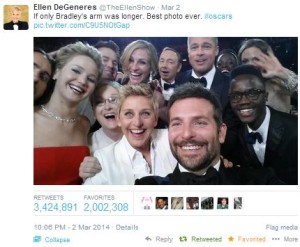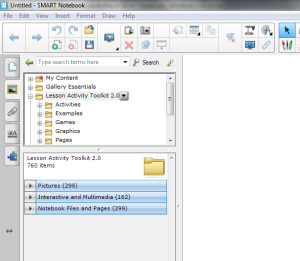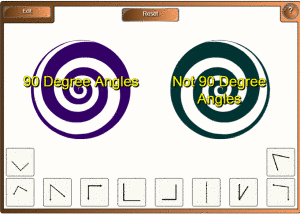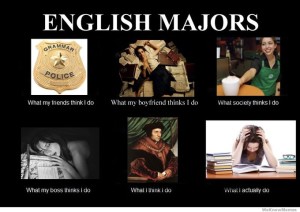 Let’s face it: English majors probably fall victim to ridicule much more often than other college students. Our peers in the math or science departments might ask well-intentioned, yet still annoying questions like, “So, you guys just read all day? Like a book club?” Others likely judge us for being hypersensitive or overemotional. And 9 times out of 10, I get, “Oh, you must be one of those grammar Nazis then.” Yep, my homepage is Purdue OWL, and I’m spending large amounts of my time and money learning how to call you out for your incorrect use of “there/their/they’re.” Our major has even inspired a catchy show tune (See Avenue Q’s “What Do You Do with a B.A. in English?”). Perhaps the most frustrating
Let’s face it: English majors probably fall victim to ridicule much more often than other college students. Our peers in the math or science departments might ask well-intentioned, yet still annoying questions like, “So, you guys just read all day? Like a book club?” Others likely judge us for being hypersensitive or overemotional. And 9 times out of 10, I get, “Oh, you must be one of those grammar Nazis then.” Yep, my homepage is Purdue OWL, and I’m spending large amounts of my time and money learning how to call you out for your incorrect use of “there/their/they’re.” Our major has even inspired a catchy show tune (See Avenue Q’s “What Do You Do with a B.A. in English?”). Perhaps the most frustrating 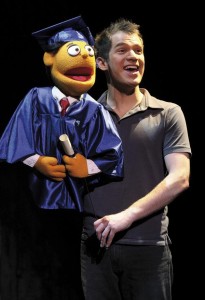 questions of all is, “You’re an English major? So you’re going to be a teacher then?” I actually am in the School of Education, yet this question still bothers me because it seems to insinuate that there is only one possible career goal English majors aspire to: teaching. So why are we constantly having to defend ourselves and our field of study?
questions of all is, “You’re an English major? So you’re going to be a teacher then?” I actually am in the School of Education, yet this question still bothers me because it seems to insinuate that there is only one possible career goal English majors aspire to: teaching. So why are we constantly having to defend ourselves and our field of study?
Those of us who pursue a degree in English understand. We know that the content and skills we learn apply in so many different ways, and that the type of thinking we are trained to do is valuable in countless careers outside of education. It’s true that some who study English might go on to be teachers of language and literature, but that many more of us choose to be writers, editors, publishers, journalists, lawyers, public speakers, human resource specialists, and more. We acquire characteristics like interpersonal skills, analytic and synthetic skills, communication skills, and perhaps most notably, critical thinking skills; the realm of possibilities available to us is perhaps much greater than a person who choses something highly technical or specified. And yet, the stigma still exists that those of us who study English are all about “the feels.”
It’s definitely true that our area of expertise is considered comparatively subjective. But that’s precisely why we love it. It’s called English Language Arts for a reason. Authors are master artists who use the craft of language to paint a beautiful picture with nothing other than words on a page. We live for those phrases with just the right balance of connotation, edge, and flow. We get sucked into a novel because we become so wrapped up in appreciation for the story, it seemingly takes on a life of its own. When we finish a book, it’s like we’re saying goodbye to a few good friends, and there is often a feeling of emptiness. The phrase “book hangover” is becoming popular: “The inability to start a new book because you’re still living in the last book’s world.” Language is powerful and certainly has the ability to transport us somewhere else for a while, and to me, literature is life breathed into once inanimate pieces of paper.
While reading Stephen Ramsay’s chapter entitled “An Algorithmic Criticism,” I will admit I was slightly skeptical. This man favors a black-and-white approach to viewing literature that I have never experienced until this class. As English majors, we like to latch on to those gray areas, interpreting a text in different ways based on various lenses. I took Literary Criticism at Geneseo as an undergraduate, and I loved being able to find cracks in which I might read between the lines, inserting a feminist, marxist, structuralist, or psychoanalytic rendering of a given text. And yet Ramsay suggests we begin looking at our beloved literature based on nothing but the cold, hard, quantitative facts. Despite being initially reluctant, I admit that I did begin warming up to the idea of a mathematical tool that might help us read literature more concretely. I envisioned myself becoming a better defender of our art form: “In your face, physics majors. We are totally using algorithms to further our understanding and analysis of this complex theoretical text.” That should force them to take us more seriously, right? Okay then, I can get behind algorithmic criticism. Especially since education in our country is currently emphasizing strict, textual-based evidence and data-driven instruction.
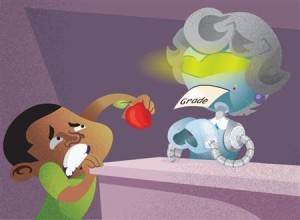 BUT THEN. I remember reading an article that was nothing short of a polar binary to the type of reading that we know and love as English majors. It’s called Robo-readers: the new teachers’ helper in the U.S., and it basically makes me want to cry. This article praises the use of robot graders in the classroom, which are supposedly more efficient, more reliable, and more accurate at grading student compositions than are humans. WHAT? I actually prefer this article – Facing a Robo-Grader? Just Keep Obfuscating Mellifluously – which, in addition to being satirical and rather entertaining, gives a much clearer picture of what these “robo-graders” are. Apparently, they are machines that are capable of “grading” up to 16,000 essays in 20 seconds. Similarly to the algorithms used in Ramsay’s piece, these robots scan compositions for length, Lexile complexity, vocabulary use, transition words, and other indicators that are somehow representative of “complex thinking.”
BUT THEN. I remember reading an article that was nothing short of a polar binary to the type of reading that we know and love as English majors. It’s called Robo-readers: the new teachers’ helper in the U.S., and it basically makes me want to cry. This article praises the use of robot graders in the classroom, which are supposedly more efficient, more reliable, and more accurate at grading student compositions than are humans. WHAT? I actually prefer this article – Facing a Robo-Grader? Just Keep Obfuscating Mellifluously – which, in addition to being satirical and rather entertaining, gives a much clearer picture of what these “robo-graders” are. Apparently, they are machines that are capable of “grading” up to 16,000 essays in 20 seconds. Similarly to the algorithms used in Ramsay’s piece, these robots scan compositions for length, Lexile complexity, vocabulary use, transition words, and other indicators that are somehow representative of “complex thinking.”
In class, we’re constantly talking about how technology is revolutionizing our lives,
and  educational institutions have been using digital upgrades like Scantrons to help grade exams for years. HOWEVER. I think it’s pretty clear the difference between a machine that can count the correct number of answers based on objective measures (filling in the correct bubble), and grading a student’s essay based on algorithms alone.
educational institutions have been using digital upgrades like Scantrons to help grade exams for years. HOWEVER. I think it’s pretty clear the difference between a machine that can count the correct number of answers based on objective measures (filling in the correct bubble), and grading a student’s essay based on algorithms alone.
The problems with robo-graders are outlined really well in the latter article I’ve referenced, but to give a quick summary: automated readers cannot identify arguably important information, such as, let’s say, TRUTH. This means a student can write an essay getting 100% of the factual information wrong, and still receive full credit. Computers also cannot detect nuances in human language such as sarcasm, and they do not understand or appreciate (and therefore cannot give credit for) creative, stylistic choices. E-raters give the best scores to the longer essays, regardless of content. They deduct points for short sentences, paragraphs, sentence fragments, phrases beginning with “or,” “and,” or “but,” etc. Does this begin to give you an idea of how scary this is for our students? Some argue that kids who are bright enough to outsmart the robo-grader and begin tailoring their writing in order to get high marks deserve them, because this sophisticated type of thinking is what warrants credit, even if students cannot write to save their lives. Sorry, what? Lastly, consider this quote from the Times article: “Two former students who are computer science majors [said] that they could design an Android app to generate essays that would receive 6’s from e-Rater. He says the nice thing about that is that smartphones would be able to submit essays directly to computer graders, and humans wouldn’t have to get involved.” Are you afraid yet?
Maybe I’m a typical, sentimental English major. Maybe I’m sounding like an old soul. Or maybe, I’m terrified of a world so quantifiable, our students need only learn how to write in order to please the grade-giving, robo-reader god. Those of us who study English do so because we recognize literature to be an art form, and because we believe in the power of language to give shape to the world. We understand English as a vehicle from which to make sense of life, and our passion for learning (and many of us for teaching) this material stems from our desire to connect with other members of humanity in a meaningful way. I’m not sure any e-Rater would understand this, let alone have the ability to truly judge our work. Maybe in the future robo-grading will become the norm, but no. Not just yet.






